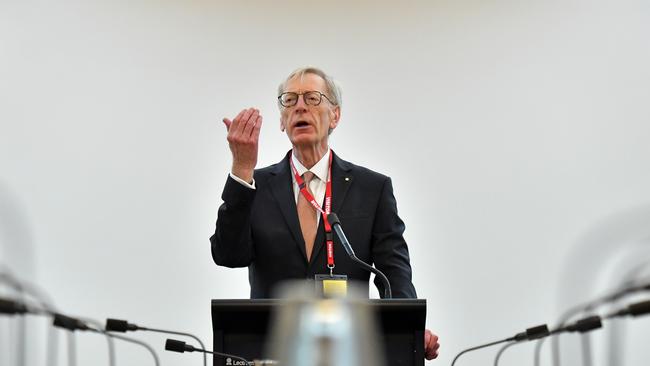Four Pillars: Banks pay for their sins: billions being spent after the royal commission

Yes, fees for no service – ranging from poor record-keeping to knowingly charging dead people – came to symbolise the very worst behaviour in an industry that had lost its ethical moorings.
Ahead of ASIC’s appearance before its parliamentary oversight committee on Friday, it should not be overlooked that billion-dollar major-bank remediation programs covering FFNS and other egregious misconduct are still in full swing, three years after royal commissioner Ken Hayne handed down his final report.
The joint committee on corporations and financial services published an update on its website last week from the Australian Securities & Investments Commission, which was responding to a question on notice from Labor senator Deborah O’Neill.
The update said Commonwealth Bank, as of June 30, 2021, had paid $960m in compensation to consumers since the 2014 financial year, with a further $1.04bn to come.
As of September 30 last year, National Australia Bank had repaid $1.03bn since June 2018, and had provisioned for a further $966m, while Westpac had reported $1.5bn in remediation.
ANZ had returned $1.8bn post-tax since March 2017, and had booked $886m for expected refunds to customers, program costs and related claims, penalties and litigation outcomes.
Outside the big four banks, AMP had paid $215m to customers for inappropriate advice and FFNS, with a further $381m to come.
ASIC warned that the numbers – obtained from company annual reports – were not directly comparable due to differences in the way remediation is reported. As things stand, ASIC is currently monitoring 64 remediations across the financial system which are likely to result in the return of $5.4bn to more than 5.6 million consumers.
As of last November, $2.78bn had been returned or offered to consumers and a further $2.62bn was still expected to be repaid.
While ASIC has some regulatory tools to address misconduct and poor remediation outcomes, the regulator noted that it has no power to direct the completion of remediations within a specific period.
The sheer size of the figures is extraordinary.
However, the truth is that they tell only half the story.
Total industry provisioning in late 2019, according to ASIC, was “well over” $10bn, reflecting the massive cost of the remediation programs themselves.
If there’s a lesson for the banks to learn from this shameful saga, it’s that systems and processes need to be properly maintained, fit for purpose, and not allowed to stagnate.
As Hayne lamented in his interim report, some entities developed a mindset that regulatory compliance was an optional cost of doing business rather than a “mandatory or minimum standard for conducting their business”.
Creating problems
The latest example of solutions searching for a problem in financial services is the House economics committee hauling regulators and the federal Treasury before parliament on Thursday for a grilling about super funds drawing on member fees to pay penalties.
Committee chair Jason Falinski’s fiery letters to ASIC, APRA and Treasury are reminiscent of Josh Frydenberg’s proxy advisory reforms, where the Treasurer has proposed clobbering four firms with $8m in combined annual revenue with penalties for wrongdoing of up to $11m.
The common enemy appears to be increasingly powerful industry super funds.
Falinski thunders in his letters to the regulatory chiefs that the Morrison government passed legislation effective from January 1 which makes it “abundantly clear” trustees cannot use member funds to pay fines.
While the legislation was a response to the IOOF saga, which featured prominently in the Hayne royal commission, it created a big problem for the industry funds because many have almost no reserves to meet the most innocuous of fines.
The nation’s biggest super fund, AustralianSuper, is a classic example, boasting $233bn in member assets as of last June but only $12 in share capital, contributed equally by an ACTU company and Australian Industry Group.
Almost any penalty at all could wipe the trustee out, at an estimated cost to members of more than $100m, even if a long-term replacement trustee is found.
The problem is exacerbated because the ACTU and AIG have both told AustralianSuper they are not prepared to contribute more capital to a risk reserve, which is unsurprising because they don’t have a financial interest entitling them to dividends or a return of capital in a wind-up.
Thankfully, the Supreme Court of South Australia approved a solution last December, enabling a change in the trust deed so the trustee can charge a risk reserve fee of up to $34.95m, or 0.015 per cent of the fund’s net assets.
AustralianSuper said the “technical” change would have no impact on member fees.
Problem solved, you might think. But no.
Falinski says in his letters that court decisions in the AustralianSuper matter and similar cases raise “serious questions about the sovereignty of the parliament”.
“APRA’s refusal to take a position in its submissions raises further questions,” he says.
“ASIC’s decision to neither appear or make a submission needs explanation and is curious given the number of times it has previously sought to take legal action.”
Falinski moans about the sovereignty of parliament but maybe he should read up on the separation of powers.
Then, if he’s truly convinced the courts have gone rogue, he should legislate to put the issue beyond doubt.
gluyasr@theaustralian.com.au Twitter: @Gluyasr



Financial services users will be eternally grateful to the Hayne royal commission for its public education role in creating awareness of the acronym FFNS.